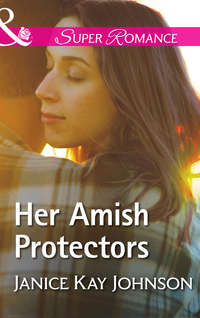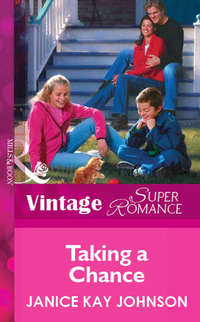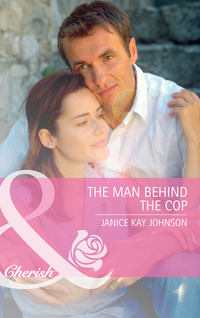
Полная версия
The New Man

“You have a date?”
Helen, Kathleen and Jo sat at the kitchen table. As Kathleen’s question indicated, the two happily married women thought Helen should also be seeking true love. She could see the gleam in their eyes now.
“I thought,” Helen said sedately, “Alec and I could talk about what it’s like losing someone you love.”
Jo’s merriment faded and Kathleen cleared her throat. “I suppose that is part of getting to know each other, but as conversation goes, it sounds pretty grim. Surely the fact that he’s a widower isn’t the only reason you’re having dinner with him!”
Helen laughed at their shock. “Of course not. Having that in common is an attraction for me, though. I’m not very interested in dating.” She saw that they wanted to say more about that and tried to divert them. “You’re sure you don’t mind watching Ginny?”
“She lives here. It hardly qualifies as baby-sitting. Besides—” Kathleen looked pleased again “—I have every intention of being here when he picks you up.”
“So you can quiz him about his intentions?” Helen asked with deceptive tranquillity.
Kathleen flashed a grin. “So I can satisfy my curiosity.”
Helen had to laugh. Okay, they were busybodies. They irritated her sometimes. But the two women were her closest friends. No, they were family. Way more important to her than Alec Fraser ever could be.
Dear Reader,
Suppose we could create an Eden where death and loss don’t exist, where nobody suffers tragedies, where we all have each other forever. My question to you is: would we all be happier than we are now, or even as happy?
My answer is no. I believe that happiness and grief, tears and joy, love and loss are inextricable parts of each other. I feel the sting of happy tears when I have a moment with another person I know I’ll never forget. The poignancy of the moment comes from the knowledge that this closeness, this conversation, this smile may never come again. We all live with the awareness that we can—and someday will—lose these people we love. Even without tragedy, our children leave home, divorce happens, friends move. Our hearts squeeze with the most acute love when we most fear loss.
What a paradox! We must fear loss to love most profoundly. But what if the fear is too great? What if we can’t bring ourselves to risk the pain of loss?
Isn’t this dilemma the core of every romance novel? In The New Man I chose to explore it head-on. I hope this book brings you to tears, even as you feel intense gratitude that you have the people in your life you love most.
Best,
Janice Kay Johnson
The New Man
Janice Kay Johnson

To my mother, with love
CONTENTS
CHAPTER ONE
CHAPTER TWO
CHAPTER THREE
CHAPTER FOUR
CHAPTER FIVE
CHAPTER SIX
CHAPTER SEVEN
CHAPTER EIGHT
CHAPTER NINE
CHAPTER TEN
CHAPTER ELEVEN
CHAPTER TWELVE
CHAPTER THIRTEEN
CHAPTER FOURTEEN
CHAPTER ONE
HELEN SCHAEFER DROVE the shiny blue pickup truck across the bumpy field and steered down an aisle of gaily colored tents. Strings of flags hung overhead, unmoving in the still air.
Bless Logan for loaning her the pickup! Helen thought. Without it, she would have had to make three or four trips from the house off Roosevelt in Seattle in her old Ford Escort to haul all the goods to set up a booth of Kathleen’s Soaps at this craft fair on Queen Anne Hill.
She and her business partner, Kathleen, had a wish list, and a cargo van was at the top of it. They were now doing dozens of fairs and craft shows a year, as well as delivering soap to the stores that sold their brand year-round. Logan, Kathleen’s husband, had been generous in letting them use his pickup, but he was a cabinetmaker and often needed it, too.
Helen glanced at the paper on the seat beside her. Number 143. Yes, there it was, printed boldly on a card pinned above the wide entrance of the booth. Number 144 next door was nearly set up, while 142 remained empty. Other exhibitors were working in tents across the aisle.
Helen rolled to a stop in front of her space and turned off the engine. Made it! she thought with relief. The pickup was big, and she was so terrified of hitting something, she was always glad to arrive safely.
“Hi,” she called, getting out.
The woman rolling a rack of silk-screened dresses into place turned with a smile. “Helen! I saw that you two were going to be my neighbors.”
“Let’s hope this weekend will be better than last.” Helen headed toward the back of the truck and lowered the tailgate.
Lucinda Blick scanned the sky. “No kidding! So far, so good.”
“The weathermen claim it’s going to be sunny and hot through Sunday.”
With practiced ease, Helen slid a pile of folding tables out onto the tailgate, then grabbed the smallest one and carried it into the red-and-white-striped tent. This card table sat at the back and held the cash register and business cards. The others, longer and sturdier, along with half a dozen folding plywood pedestals built by Logan, would display the soaps, shampoos, shower gels and bath oils made by Kathleen.
Helen and Lucinda, an improbably blond amazon who had to be in her sixties, continued to chat as they spread tablecloths and stacked wire bins that held bars of soap in Helen’s case and tie-dyed socks and scarves in a variety of hues and sizes in Lucinda’s. Other exhibitors wandered by to say hello and commiserate about last week’s downpour that had made a disaster of a craft fair in Pierce County.
Helen loved this sense of community she and Kathleen had found among other artists and craftspeople. There was gossip and jealousy, of course, but mostly they had met with generosity and friendship. All for one and one for all, as Kathleen had put it. On a good weekend, everyone profited. On a bad one, they all packed home the goods they had hoped to sell.
“Who’s in the next booth?” Helen asked, nodding to the one east of hers.
“Shannon Palmer. Have you met her?” Lucinda shook out a tablecloth. “Stained glass?”
Helen pursed her lips. “I think so. Wasn’t she in Anacortes last summer?”
“Probably.” Lucinda paused, apparently scanning Commercial Street in Anacortes in her mind’s eye. “Wait. Yes!” she exclaimed in triumph. “She was just past what’s-his-name with the flying elephants!”
“Oh, right,” Helen agreed. “He got mad when her rack collapsed.”
“He gets mad if he thinks one of your tables pushes the tent wall two inches into his space. Try not to get stuck next to him if you can help it.” Lucinda shook her head. “I never can remember his name,” she muttered. Hands on her hips, she contemplated her progress. “I’m starving. Will you keep an eye on my stuff?”
“Of course.”
“Can I bring you anything?”
“I packed a sandwich,” Helen said, “but thanks.”
The other woman picked up a bar of soap and sniffed. “Nice. What is it?”
“Tarragon and geranium.”
“You guys use the most peculiar combinations.” Lucinda grinned and headed down the grassy aisle. “See you,” she called, with a flap of her hand.
Enjoying the warm early-summer evening, Helen continued arranging their wares. Baskets, spray-painted and decorated by her, brimmed with selections of soap and oils and gels. Bars of soap, clear and shimmering with color or milky and dark-flecked, went into labeled bins. Carefully constructed stacks of soap went on pedestals and tables, along with bottles of soapwort shampoo and herbal hair rinses and wintergreen-scented bath oil.
New this year were the pet shampoo, the herbal bath bags and the gritty bars of soap for gardeners or mechanics. Helen expected them all to be successful. She was amazed at Kathleen’s creativity. Lucinda was right: the oddest combinations of herbs and essential oils sometimes produced heavenly scents.
She felt incredibly lucky to be Kathleen Carr’s partner. It hardly seemed fair that she should be an equal partner, considering Kathleen made all the soap. Helen had been the one to suggest that her housemate turn a hobby into a business, however, and she had taken over the task of selling the wonderfully fragrant bars. The packaging was hers—she continually tinkered to improve it—and she was the one who girded herself and approached store owners and buyers to try to persuade them to carry Kathleen’s Soaps.
She helped as much as she could when Kathleen went into a frenzy of soap making. Helen did cleanup and stirred and sometimes added pre-measured oils to the bubbling brew when Kathleen told her to. She unmolded bars that had cured with designs imprinted in them and carved into bars glycerine soaps that had been made into long loaves.
But in fact Helen was the business partner, Kathleen the creative one. Extraordinarily, in only their second year Kathleen’s Soaps was taking off. Dozens of retailers, from small gift shops to health food stores and co-ops, carried their soap now. And in a good weekend at a big craft show like this one, they would sell most of the stock Helen had hauled down.
Both Helen and Kathleen still held other jobs, but now worked only part-time. Last summer, the craft fairs had involved a nightmarish juggling of schedules, with everyone else they knew called in to help when both had to be at their other, more mundane, jobs. Even Kathleen’s teenage daughter, Emma, had manned booths alone.
On a day like this, with the sun shining and plenty of time to set up, Helen felt more relaxed and…happier than she had in years. Since before Ben’s cancer was diagnosed.
How amazing! she thought, pausing for a moment. She’d never expected to be happy again.
“Hello,” a man said behind her.
Her reverie interrupted, Helen lifted a basket from the tailgate and turned with a pleasant, “Hi.”
But the man standing there wasn’t one of the craftspeople she knew. In fact, he didn’t look like an artist at all, although she wasn’t quite sure why. Thick, dark hair cut a bit too short, maybe, and graying at the temples in a way that appeared distinguished rather than scruffy.
He was very handsome, with sharply drawn cheekbones and a strong, cleft chin. Despite that hint of gray, she doubted the man was over forty. In jeans and a polo shirt, he was well-built, perhaps six feet tall, with dark blue eyes that appraised her over the bow that decorated the handle of the basket she clutched.
“Alec Fraser.” He nodded at the basket. “Can I take that?”
“Oh…thank you.” Helen held it out. “I’m Helen Schaefer. Just set it anywhere over there.” She reached back to grab the next, more to give herself a moment to recover her composure than because she actually needed to keep working. She hadn’t felt any sexual reaction at all in so long she was surprised she recognized it. Maybe it wasn’t specific to this man, she comforted herself; maybe the brief flutter in her chest was related to the giddy knowledge that she had learned to be happy again.
Waiting inside her tent, Alec Fraser turned slowly to look at the displays she was setting up. He sniffed. “Smells great.”
Feeling steadier, she said, “Oh, thank you.” She was so used to the fragrance that filled their house and cars and even clung to her clothes that she scarcely noticed it anymore. “When they’re browsing, people pick up every soap and sniff it. I love watching their expressions. They’ll go from delight to ‘yuck’ in a heartbeat.”
He laughed, turning handsome into devilish and—damn it! there she went again—sexy.
“You mean, the vanilla fan doesn’t like the, uh, avocado-dill soap?” He took an experimental whiff of that one and looked torn.
Helen smiled at his expression. “Exactly. I’ve wondered whether you could generalize about character type from responses to particular scents, but I’m afraid results aren’t consistent.”
“What about you?” Alec Fraser asked, nodding toward one of the pyramids of soap, his blue eyes not leaving her face. “What’s your favorite?”
She knew she was blushing; her cheeks were warm. “Oh, I’m afraid I’m bland. I like gentle, homey scents. Vanilla and cinnamon and blueberry.”
“And yet—” he lifted a hand as if he were going to touch her auburn hair, secured in a ponytail, before he seemed to think better of it and let his arm drop “—you look as if you could be fiery.”
Fiery? The idea was laughable. A mouse like her!
“Appearances can be deceptive,” she told him, her good mood crumbling at the edges. She made her voice deliberately polite. “Do you have a booth here?”
“No, I’m with the committee putting on the fair. I’m just making the rounds to welcome everyone. I think I forgot to say thanks for coming.”
“You’re very welcome.” She made a business of returning to the truck, only to discover she’d grabbed the last basket or box within reach. Hoisting herself onto the tailgate wasn’t the most dignified performance to put on in front of a man Emma would say was “hot—for an older guy.”
“Let me,” the older guy said, and swung himself up with a fraction of the effort it would have taken her. He then very efficiently moved boxes and the few stray baskets to the tailgate, where she could reach them.
Since he seemed determined to help, Helen ferried goods into the tent as he pushed them within her reach. After a few minutes, he jumped down and helped her, the muscles in his arms flexing nicely as he lifted the heavier boxes.
“You don’t have to…really I can…” she tried to say several times only to be silenced with a glance or a firm “I want to.”
Finally Helen let him haul while she unpacked. When he set down a box and said, “Well, that’s the last.” She tilted her head to be sure she liked the display on the table in front of her, nodded in satisfaction, and turned to him.
“You were a huge help. Thank you. Do you unload for every exhibitor?”
“Ah…no. You just looked like you could use some volunteer labor.”
In other words, she thought, she had looked helpless. Weak.
He picked up a bar of soap and took the standard sniff. His expression suggested that he thought raspberry sorbet was interesting but not altogether pleasing. “Is there a Kathleen?”
“Kathleen?” She blinked, realizing she sounded like an idiot. “Oh. Yes. She’s my partner. She creates, I market.”
“A businesswoman.”
“Well…” How silly to hesitate. “I suppose I am.”
His perceptive gaze noted the uncertainty. “You sound doubtful.”
“This is a relatively new venture for us. I’m not used to thinking of myself that way.” She didn’t like to admit to shaky self-esteem.
He lifted an eyebrow. “We’re selective here in Queen Anne. You wouldn’t have a booth if you didn’t have a great product and you weren’t persuasive.”
“Kathleen makes the best soap in the world.” On impulse, Helen said, “Take one. It’s on us.”
He gave her a rakish grin. “Bribing me?”
“No, no.” She kept her expression innocent. “Just curious what scent appeals to you.”
Alec Fraser was already sampling bars, his reactions subtle but visible. “So, I’m a guinea pig.”
“Something like that.” Helen crossed her arms and watched him. “I need new subjects, you know.”
“You’re probably a graduate student working on a dissertation,” he muttered. After smelling the watermelon glycerin soap, he looked undecided, then set it down.
Rather than thanking her and grabbing the first bar, to her secret amusement, he took the choosing quite seriously. Maybe he didn’t want to smell tropical when he emerged from his morning shower.
Blueberry? His face said maybe. Goat’s milk and cucumber? No. Definitely. Vehemently, even. Lemon tart pleased him, but not enough.
The winner, when he turned from the wire bins, was aloe and eucalyptus.
“Good choice.”
He smiled. “Most of these were making me hungry.”
“You don’t want to smell good enough to eat?” Helen couldn’t believe she’d said that, especially in such a, well, flirtatious way.
His eyes glinted, and his voice seemed to deepen. “I could be persuaded.”
Lucinda Blick caroled, “I’m back!” The smell of fish and chips arrived with her. “Thanks for watching…oh.” She stopped in the entrance to the tent, immediately noticing Alec Fraser. “Hello.”
He smiled easily and introduced himself. When Lucinda identified herself as the neighboring vendor, he commented on her beautiful silk scarves with a charm that struck Helen as practiced, or perhaps only rehearsed.
Then he smiled impartially at both women and said, “I’d better get my welcome wagon moving, or I won’t make it all the way around. It was good to meet both of you.” His gaze lingered on Helen’s face. “And thank you for this.” He bounced the soap in his hand like a kid with a baseball.
“You’re welcome.”
A moment later, he was gone. Helen pretended she didn’t mind.
“Enjoy your dinner?”
Lucinda peered out. “Lucky him, he’s been way-laid by Nancy Pearce. She’ll find something to complain about.”
“Oh, maybe not.”
“You’re too charitable,” her blond neighbor said dryly. “Our Nancy likes doing the fancy indoor shows. Outside, the ground is always bumpy, she never likes her assigned spot, and if it isn’t raining it’s too hot.”
Helen couldn’t help chuckling, even though she felt guilty. “She claimed to have twisted her ankle last week, there was such an awful hole right in the middle of her space.”
“Conveniently covered by a table skirt, so nobody else could see it.”
“Well…yes.”
Still spying, Lucinda said, “She’s laughing! Can you believe it?”
Yes, Helen thought but didn’t say. She could.
“Actually—” Lucinda sounded thoughtful “—I’m not totally surprised. He did have a lovely smile. And shoulders.” She craned her neck a little farther as Alec Fraser apparently crossed the aisle. “Oh, hell. He’s gorgeous.” She sighed and turned. “Who could be immune?”
“Not me,” Helen admitted. “Especially after he unloaded half my stuff for me.”
“I wonder if he’s married,” Lucinda mused. She pinned her gaze on Helen. “Are you married?”
“No, and not looking,” Helen said firmly. She lifted a wooden box from a cardboard carton and set it on the table, opening the lid to reveal the soaps packed inside.
Lucinda touched the silky smooth wood. “Those are beauties. I meant to tell you last week.”
“Kathleen’s husband is a cabinetmaker. This was his idea. Of course, he makes them.”
“They’ll sell like hotcakes.” Lucinda wasn’t to be diverted. “Why aren’t you looking?”
None of your business, trembled on Helen’s lips but remained unsaid. Lucinda had been too nice to her.
“I’m a widow.” Her words were clipped. “I loved my husband deeply. His illness was…terrible. I won’t face anything like that ever again.”
“How long ago?”
“Nearly three years.”
Voice gruff, the older woman said, “I hope you change your mind. My first husband was killed in Vietnam. I couldn’t imagine going through that a second time. Now, I can’t imagine not having had the past twenty years with Monty.”
“I didn’t know….”
“That I was married? We have a deal. I do craft shows, he golfs.” The bawdy grin was unexpected on her weathered face. “The rest of the time, we honeymoon.”
Helen couldn’t help laughing again. “Who knows? Maybe I’ll be lucky enough to meet a Monty someday. But…not yet.”
“Maybe you’re readier than you know.” Lucinda waggled her eyebrows as she gave a meaningful glance in Alec Fraser’s direction. Then, before Helen could argue, she let out an exasperated sigh. “Listen to my tongue flap. I never give advice, don’t believe in it. Anyway, I still have a ton to do.” She lifted a hand in farewell and rounded the tent walls into her own space.
A moment later, Helen heard the clank of a rack being assembled and the growl of her neighbor mumbling to herself.
Helen was left feeling unsettled, her sunny sense of contentment clouded by memories and by the unwelcome awareness of a man who wasn’t Ben Schaefer.
No, she wasn’t ready. She never would be. Once was enough. Ben couldn’t be replaced.
She knew even as the thought formed that she was lying to herself. It wasn’t that no one would ever measure up to her husband. He’d had his flaws. Just because he had died, she wasn’t going to turn him into a fairy-tale prince. There probably were men out there with whom she could fall in love.
She just didn’t want to.
Having Ben torn from her had hurt too bad. The agony of seeing him lose his hair and his robust color and his muscle tone and finally even the smile in his eyes and the strength in his voice had been unspeakable. Even worse was saying goodbye every day, with every touch and word, for a year and a half.
After the funeral, people had patted her hand and said kindly, “The worst is over. At least this wasn’t a surprise. You’ve had time to grieve in advance, to say goodbye. I know you’re grateful for the time you had with him this past year.”
Was she? Helen didn’t know. She had tried a thousand times to imagine how it would have been if Ben had been late for dinner one night, and a knock came on her door. She could see herself opening it, finding a police officer standing there with compassion written on his face. “I’m sorry,” he’d say. “Your husband has been in a car accident. He’s dead.”
Perhaps they weren’t that blunt. She didn’t know. Maybe they told you to sit down first, or suggested you call a friend or relative to hold your hand. That wasn’t the point.
The point was the suddenness. Ben—the Ben she had married and held the night before and laughed with that morning—would be gone. Poof. His life snuffed out in an instant rather than inch by excruciating inch.
She knew the shock would have been stunning, the grief overwhelming. Grief, she understood. But her last memory would have been of Ben’s smile, the warmth of his lips when he kissed her goodbye, as he did every morning. As he had every morning, until he became too ill to go to work, and then too ill to get out of bed at all.
Instead she’d had to watch him suffer, his wry humor and intelligence and personality disintegrating until only pain and regret were left. She’d had to believe, for a long time, that each new treatment would work, that he could get better. And then she’d had to pretend that she believed, for his sake and for Ginny’s.
And because she was too stubborn, too selfish, to let go. She had made him try hopeless treatments and suffer longer than he had to because she didn’t want to lose him.
All she knew was, Ben’s death had been so dreadful, she never, ever wanted to love someone else and lose him.
Which meant that these stirrings of sexual interest were unwelcome. Some people could separate sex from love, but she wasn’t one of them.
Studying the display with unseeing eyes, Helen decided that it was lucky Alec Fraser wasn’t an executive at Nordstrom, where she worked, or a neighbor, or a friend of Logan’s, or anyone else she would see on a regular basis. He was a stranger, presumably a resident of Queen Anne, a part of Seattle where she rarely went, and she would very likely never see him again.
Ignoring the sinking sensation she felt at her own pronouncement, she nodded. It was definitely best if she didn’t meet Alec Fraser again.
TWO HOURS LATER, Alec detoured down the first aisle again. Just to see if any of the missing exhibitors had arrived, he told himself.
As a result, he had to waste fifteen minutes explaining to a jackass he remembered from two years ago why he had been assigned a location that was apparently undesirable.








